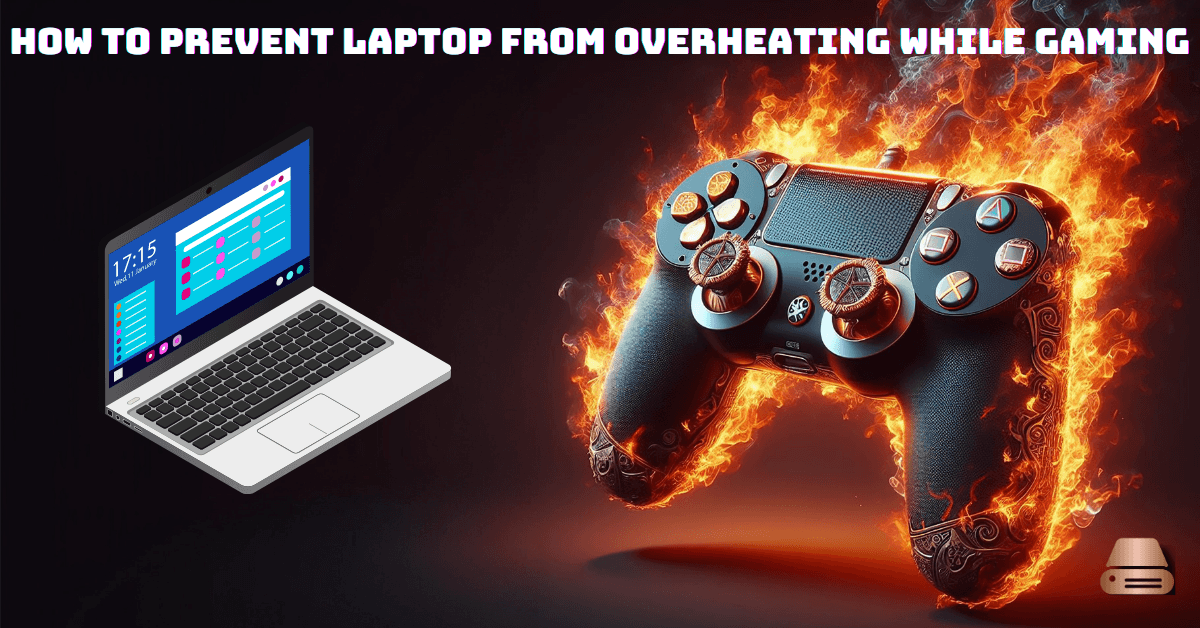Gaming on laptops can be a thrilling experience, but overheating issues can ruin the fun. Whether you’re a casual gamer or a competitive enthusiast, knowing how to keep your laptop cool is essential. Overheating not only affects performance but can also shorten the lifespan of your device. Let’s dive into the steps you can take to prevent laptop from overheating while gaming and enjoy uninterrupted gameplay.
Understanding Laptop Overheating
Causes of Laptop Overheating During Gaming
Gaming is resource-intensive, pushing your laptop’s CPU and GPU to their limits. Common causes include:
- Poor Ventilation: Blocked vents or poor placement restrict airflow, causing heat buildup.
- High Graphics Settings: Demanding graphics settings increase power consumption and heat output.
- Dust and Debris: Accumulated dust in fans and vents reduces cooling efficiency.
- Old Thermal Paste: Degraded thermal paste between the CPU/GPU and heat sink leads to inefficient heat transfer.
Signs Your Laptop is Overheating
Knowing the signs of overheating can help you address the issue before it worsens:
- The laptop’s surface feels unusually hot.
- Fans are running loudly and constantly.
- Performance drops, with lag or stuttering during games.
- Sudden shutdowns to protect hardware.
Why Laptop Overheating is a Serious Concern
Impact on Hardware Longevity
Excessive heat can damage internal components like the motherboard, CPU, and GPU. Prolonged exposure to high temperatures shortens their lifespan, leading to costly repairs or replacements.
Performance Throttling and Lag
When a laptop overheats, its system may throttle performance to cool down, causing frame rate drops and lag—a nightmare for gamers.
Risks to User Safety
Overheating can pose safety hazards, such as burns from hot surfaces or even battery malfunctions that may lead to fires.
Top Tips to Prevent Laptop from Overheating While Gaming
Optimize Your Gaming Settings
Adjusting Graphics and Frame Rates
Lowering graphics settings, such as resolution and texture quality, reduces the strain on your GPU. Limiting frame rates can also help keep temperatures in check.
Closing Unnecessary Background Applications
Close applications and processes running in the background to free up resources and reduce CPU/GPU workload.
Ensure Proper Ventilation
Positioning Your Laptop for Better Airflow
Place your laptop on a hard, flat surface to allow unobstructed airflow to the vents. Avoid placing it on soft surfaces like beds or couches that block ventilation.
Using Cooling Pads or Stands
Invest in a quality cooling pad or laptop stand with built-in fans to enhance airflow and dissipate heat effectively.
Regular Maintenance and Cleaning
Removing Dust from Fans and Vents
Use compressed air to clean dust from fans and vents. Regular cleaning prevents dust buildup that hinders cooling and helps prevent laptop from overheating.
Monitoring and Replacing Thermal Paste
Thermal paste degrades over time, reducing heat transfer efficiency. Reapplying high-quality thermal paste every 1-2 years can significantly improve cooling and help prevent laptop from overheating.
Monitor and Manage Temperature
Software Tools to Track Laptop Temperatures
Use software like HWMonitor or Core Temp to monitor your laptop’s temperature in real-time. This helps you identify potential overheating issues early.
Setting Up Temperature Alerts
Many monitoring tools allow you to set temperature alerts, ensuring you’re notified if your laptop exceeds safe levels.
Invest in High-Quality Cooling Accessories
High-performance cooling pads, external fans, and laptop stands are worth the investment for gamers who frequently push their laptops to their limits. These accessories are essential to prevent laptop from overheating during extended gaming sessions.
Gaming-Specific Laptop Features to Look For
Advanced Cooling Systems in Gaming Laptops
Modern gaming laptops often feature advanced cooling solutions, such as vapor chambers and multiple fan setups. Consider these features when buying a laptop to help prevent laptop from overheating.
Choosing the Right Hardware Specifications
Opt for laptops with powerful yet efficient CPUs and GPUs. Models with lower TDP (Thermal Design Power) ratings generate less heat and are less likely to overheat during gaming.
Importance of Efficient Power Management
Efficient power management settings, such as balanced or eco modes, can help regulate performance and reduce heat during less demanding tasks, aiding in preventing laptop from overheating.
Common Myths About Laptop Overheating
Debunking Popular Misconceptions
- “Placing ice packs under the laptop helps”: This can cause condensation, damaging internal components.
- “Overheating only happens in older laptops”: New laptops can overheat too if not used properly.
Why DIY Solutions Might Not Always Work
While DIY fixes like propping up your laptop can help, they’re no substitute for proper cooling pads or regular maintenance to prevent laptop from overheating effectively.
Conclusion: Enjoy Gaming Without Worrying About Overheating
By following these tips, you can keep your laptop cool and game to your heart’s content. Regular maintenance, investing in cooling accessories, and optimizing settings are key to preventing laptops from overheating. Stay proactive, and your laptop will reward you with consistent performance and a longer lifespan.
Thanks for visiting my site, If you have any doubts or questions regarding SSDs or computers please feel free to contact us.
FAQs About Preventing Laptop from Overheating While Gaming
How often should I clean my laptop to prevent overheating?
Clean your laptop’s fans and vents every 3-6 months, or more frequently if you use it in a dusty environment.
Are cooling pads effective for gaming laptops?
Yes, cooling pads provide additional airflow, reducing surface temperature and improving performance during gaming sessions, which helps prevent laptop from overheating.
What is the ideal gaming temperature for laptops?
The ideal range is 60-85°C. Exceeding this for prolonged periods can lead to thermal throttling or hardware damage.
Should I avoid gaming for long hours to prevent overheating?
Taking breaks during long gaming sessions allows your laptop to cool down, preventing sustained overheating and helping to prevent laptop from overheating.
